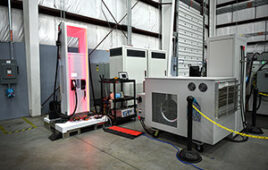Helen Clark, the administrator of the United Nations Development Program, visited Stanford to set the stage for international climate talks taking place in Doha, Qatar, later this month.
“Until recently, climate change seemed like a science fiction scenario,” Helen Clark told a Stanford audience recently.
Clark, the administrator of the United Nations Development Program and former prime minister of New Zealand, argued that a lack of coordinated global action on the issue is undermining efforts to alleviate extreme poverty. Climate change is damaging agriculture, driving up food prices, creating water insecurity, destroying coral reef fishing grounds and exposing millions to diseases such as diarrhea, dengue fever and malaria, she said.
Ahead of global climate negotiations set to begin in Doha, Qatar, later this month, Clark visited campus on the heels of Superstorm Sandy in the Eastern United States and a wave of extreme weather events worldwide. “It’s not just a problem for small coastal regions in developing countries,” she said.
Her Environmental Forum talk was co-sponsored by the Stanford Woods Institute for the Environment and Stanford’s Program in Human Biology.
The Doha talks will be the 18th conference of the 192 signatory countries of the U.N. Framework Convention on Climate Change and the Kyoto Protocol – the only internationally legally binding regulations on climate protection.
International discussion on the issues has tended to focus on the long term rather than the short term, and to underestimate the effect on poor populations, Clark said. Commitments such as developed countries’ pledge to give $100 billion to an adaptation fund have fallen through.
Clark reviewed key areas: regular reviews of international climate actions planned and taken; private climate financing and carbon markets; increased international cooperation to deploy new technologies; and addressing greenhouse gas emissions created through forest loss and degradation.
Using California as a model of climate progress, she pointed specifically to the state’s cap-and-trade program launching this year as part of the Global Warming Solutions Act of 2006.
Any action should be interdisciplinary in approach, Clark said, arguing that real progress would require holistic changes in government and social structures, “just as fixing health problems is about far more than fixing your hospital system.” She pointed to corruption and weak government as enabling forces behind deforestation and forest degradation – the source of about a fifth of the world’s greenhouse gas emissions.
Like any intractable problem, climate change cannot be tackled by government alone, Clark said. Grassroots advocacy and consumer choices – “bottom-up action” – will drive meaningful progress, she said, citing recent surveys showing increased public support for action on climate change. “The costs of inaction are increasingly clear.”
In an interview following her lecture, Clark stressed the need for President Obama to use the momentum of his re-election to act quickly on climate change. “There is a window of opportunity to see the U.S. take a strong position,” Clark told ClimateWire. “This is the hour for moving on climate change. I think it’s time to mobilize, and not just the U.S., but worldwide.”
Read the full text of Clark’s speech.
Rob Jordan is the communications writer for the Stanford Woods Institute for the Environment.
Media Contact
Rob Jordan, communications, Stanford Woods Institute for the Environment: (650) 721-1881, [email protected]
Dan Stober, Stanford News Service: (650) 721-6965, [email protected]





